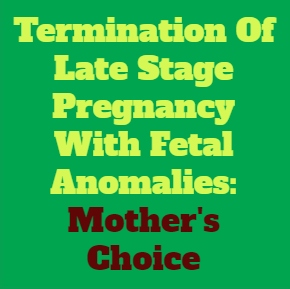

By Sunil Garodia
First publised on 2023-01-24 08:40:23
In a
well-reasoned order, the Bombay High Court allowed a mother to medically
terminate her 33-week old pregnancy even though the medical board, citing the late
gestation stage and free treatment of the child to treat deformities, had denied permission. The mother had sought termination as it
was discovered in the 29th week of pregnancy that the unborn child
had several problems including an abnormally small head and brain (medically
called microcephaly) and a smooth brain (called lissencephaly). After the
medical board denied permission, she approached the high court which asked the
medical board for a follow-up opinion to assess if the child would require
life-long medical intervention and what risks such a late stage termination
would pose to the mother.
Obviously,
the bench was not satisfied with the opinion and decision of the medical board
and ruled that any decision to terminate a late pregnancy in which the foetus was
found having multiple anomalies lied solely with the woman and if it was not
life-threatening for her, she could go ahead with the abortion even if it was
denied by the medical board. The court rightly ruled that it was "not the right
of the court to abrogate the petitionerâs right once they are found to fall
within the contemplation of law".
This question of allowing medical termination of pregnancy to women who find in an advanced stage of pregnancy that the unborn child will be born with several deformities and might require expensive medical intervention which they might not want to bear has become a regular issue since the law in India allows legal abortion only up to 24 weeks if all is normal but leaves it to the discretion of a medical board where serious fetal abnormalities are found in advanced stages of pregnancy.
But, as the Bombay HC said in its judgment, it is not only a medical issue. It said that "in cases such as these, we believe, the courts must calibrate themselves not only to the facts as they stand but must also consider that what these cases present are, above all, profound questions of identity, agency, self-determination and the right to make an informed choice". The Delhi HC had similarly allowed a woman to terminate her 33-week old pregnancy in December last year after it was detected at a late stage that the unborn child had several deformities.
In the instant case, the medical board, while denying
permission, had said that the deformity is correctable free of cost at
government hospitals. But as the Delhi HC said in its judgment, there is always "the likelihood of the child being born with deformities, and living with
deformities, coupled with the risks of surgery at such a nascent stage after
being born, the results of which are also not conclusively known, and the
lingering question as to whether the child would be self-sustaining or not" and
these questions must tilt the court's mind in the favour of the petitioner.











